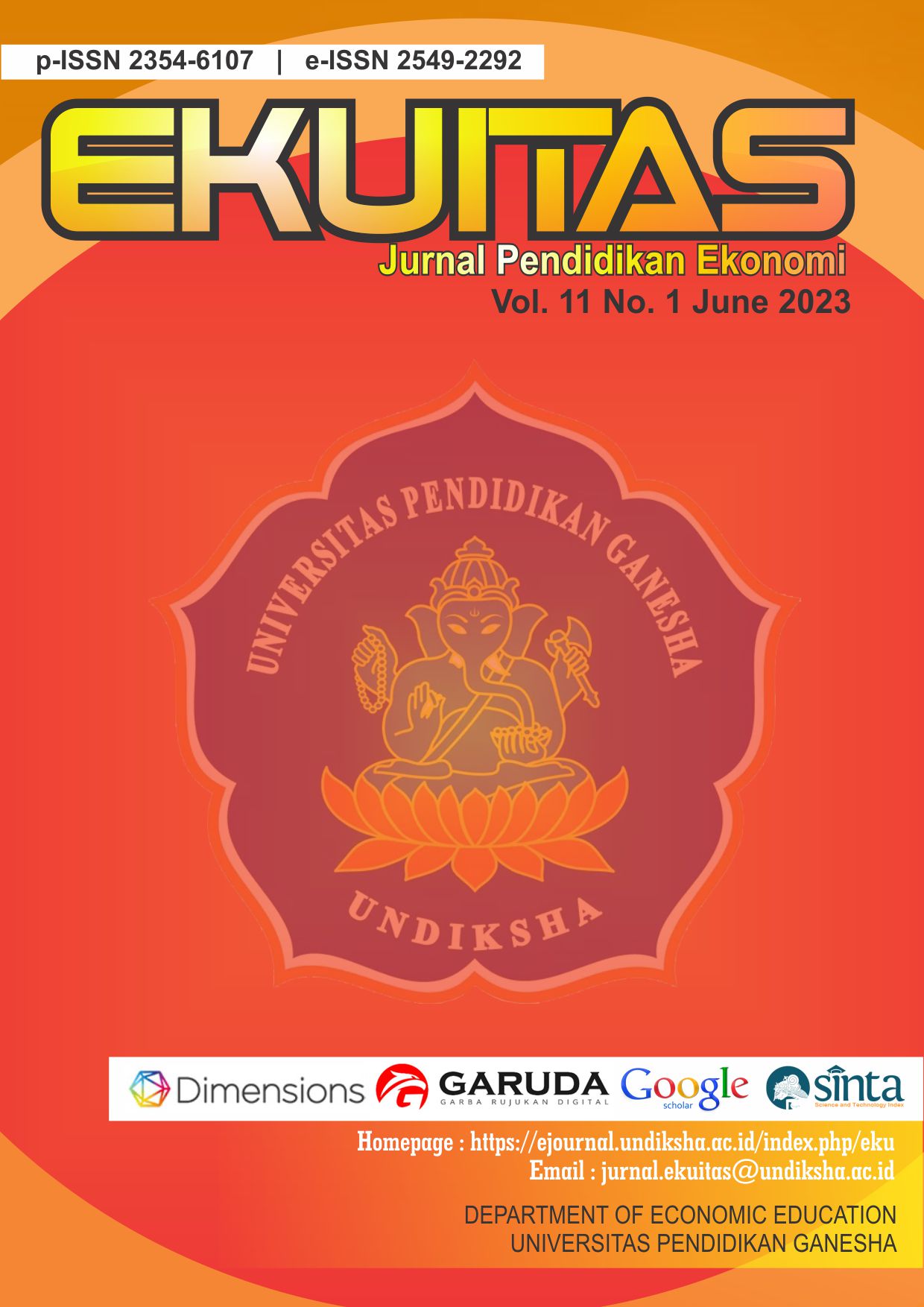Rationalization of Action in Education Investment Decisions: Parents' Perceptions
DOI:
https://doi.org/10.23887/ekuitas.v11i1.62249Keywords:
Educational investment, instrumental, rationalization of action, value.Abstract
This research aims to see how the rationality of parents towards their decision to act in improving the quality of human resources owned by children through education. This is due to the problems that arise from various theoretical studies on "Is the decision taken by parents in sending their children to school a rational action or is it only limited to the fulfillment of educational policies that have been made by the government in supporting the improvement of the quality of human resources through education?". Therefore, to answer the problems and objectives of this study, the researchers used a type of quantitative research with correlation and regression test methods. The research data was collected using a 7-point scale research instrument distributed through an online survey, and the data obtained was 185 respondents. The population and sample in the study were parents of students in class XII, Malang, East Java. The results of the study revealed that instrumental action rationalization and value action rationalization were able to significantly influence parents' decisions in investing in education. The hope of this research is more emphasized on the ability of parents to think rationally when making decisions to invest in children's education, especially on rational analysis of costs and benefits, and avoiding implicit or emotional decisions. Therefore, further research is needed on how parents respond to the decision to invest in education when viewed from other factors, both from internal parents and external factors from parents.
References
Ajzen, I. (1991). The theory of planned behavior. Organizational Behavior and Human Decision Processes, 50(2), 179–211. https://doi.org/10.1016/0749-5978(91)90020-T
Alonso-Carrera, J., Caballé, J., & Raurich, X. (2020). Intergenerational mobility in education and occupation. Macroeconomic Dynamics, 24(2), 291–326. https://doi.org/10.1017/S1365100518000226
Banks, J., Carvalho, L. S., & Perez-Arce, F. (2019). Education, Decision Making, and Economic Rationality. The Review of Economics and Statistics, 101(3), 428–441. https://doi.org/10.1162/rest_a_00785
Baron, J. (2007). Thinking and Deciding. New York: Cambridge University Press.
Cochran, W. G. (1977). Samling Techniques. United State: John Wiley & Sons, Inc,.
Cushman, F. (2020). Rationalization is rational. Behavioral and Brain Sciences, 43, e28. https://doi.org/10.1017/S0140525X19001730
Dhanaraj, S., Paul, C. M., & Gade, S. (2019). Household income dynamics and investment in children: Evidence from India. Education Economics, 27(5), 507–520. https://doi.org/10.1080/09645292.2019.1599325
Dizon-Ross, R. (2019). Parents’ Beliefs about Their Children’s Academic Ability: Implications for Educational Investments. American Economic Review, 109(8), 2728–2765. https://doi.org/10.1257/aer.20171172
Domino, P. (2018). Investasi Dalam Bidang Pendidikan Anak Untuk Meningkatkan Kualitas Kehidupan Keluarga. Jurnal Inovasi Pendidikan Dasar, 2(1), 77–85. https://doi.org/https://doi.org/10.21067/jbpd.v2i2.2534
Edwards, W. (1954). The theory of decision making. Psychological Bulletin, 51(4), 380–417. https://doi.org/10.1037/h0053870
Fast, N. J., & Jago, A. S. (2020). Privacy matters… or does It? Algorithms, rationalization, and the erosion of concern for privacy. Current Opinion in Psychology, 31, 44–48. https://doi.org/10.1016/j.copsyc.2019.07.011
Hastie, R., & Dawes, R. M. (2010). Rational choice in an uncertain world: The psychology of judgment and decision making, 2nd ed. Singapore: Sage Publisher.
Heckman, S. J., & Letkiewicz, J. C. (2021). Navigating Risky Higher Education Investments: Implications for Practitioners and Consumers. Journal of Financial Counseling and Planning, 32(1), 131–145. https://doi.org/10.1891/JFCP-18-00002
Hernandez, J. G. V., & Ortega, R. P. (2019). Bounded rationality in decision–making. MOJ Current Research & Reviews, 2(1), 1–8. https://doi.org/10.15406/10.15406/mojcrr.2019.02.00047
Hidayat, R. (2016). Rasionalitas: Overview terhadap Pemikiran dalam 50 Tahun Terakhir. Buletin Psikologi, 24(2), 101–122. https://doi.org/10.22146/buletinpsikologi.26772
Jin, J. (2020). Exploration on Diversification Path of Higher Education Investment. Academic Journal of Humanities & Social Science, 3(9), 51–54. https://doi.org/10.25236/AJHSS.2020.030905
Jotform. (2022). JOTFORM VS GOOGLE FORMS - Comparison Chart. Retrieved from https://www.jotform.com/google-forms-alternative/compare/
Lambert, T. E. (2019). Rationality and Capitalist Schooling. Journal of Economic and Social Thought, 2(2), 106–120. https://doi.org/https://dx.doi.org/10.2139/ssrn.3356575
Madani, R. A. (2019). Analysis of Educational Quality, a Goal of Education for All Policy. Higher Education Studies, 9(1), 100. https://doi.org/10.5539/hes.v9n1p100
Moorhead, G., & Griffin, R. W. (2013). Perilaku Organisasi Manajemen Sumber Daya Manusia dan Organisasi. Jakarta: Salemba Empat.
Patrinos, H. A., & Psacharopoulos, G. (2020). Returns to education in developing countries. In The Economics of Education (pp. 53–64). Elsevier. https://doi.org/10.1016/B978-0-12-815391-8.00004-5
Ritzer, G. (2010). Sociological Theory (8th ed.). New York: McGraw-Hill Education.
Sahnoun, M., & Abdennadher, C. (2022). Returns to Investment in Education in the OECD Countries: Does Governance Quality Matter? Journal of the Knowledge Economy, 13(3), 1819–1842. https://doi.org/10.1007/s13132-021-00783-0
Santos, L. R., & Rosati, A. G. (2015). The Evolutionary Roots of Human Decision Making. Annual Review of Psychology, 66(1), 321–347. https://doi.org/10.1146/annurev-psych-010814-015310
Schofer, E., Ramirez, F. O., & Meyer, J. W. (2021). The Societal Consequences of Higher Education. Sociology of Education, 94(1), 1–19. https://doi.org/10.1177/0038040720942912
Schonlau, M., Fricker, R. D., & Elliott, M. N. (2002). Conducting Research Surveys via E-Mail and the Web (Vol. 148). Santa Monica: RAND.
Shafir, E., & LeBoeuf, R. A. (2002). Rationality. Annual Review of Psychology, 53(1), 491–517. https://doi.org/10.1146/annurev.psych.53.100901.135213
Stanovich, K. E. (2016). The Comprehensive Assessment of Rational Thinking. Educational Psychologist, 51(1), 23–34. https://doi.org/10.1080/00461520.2015.1125787
Stocké, V. (2019). The rational choice paradigm in the sociology of education. In Research Handbook on the Sociology of Education. Edward Elgar Publishing. https://doi.org/10.4337/9781788110426.00011
Sue, V. M., & Ritter, L. A. (2007). Conducting Online Survey (Vol. 148). United State: Sage Publications Ltd.
Sugiyono. (2019). Metode Penelitian Kuantitatif, Kualitatif dan R&D. Bandung: Alfabeta.
Tamba, D. (2017). Aplikasi Theory Of Planned Behavior untuk Memprediksi Perilaku Mahasiswa Membeli Laptop Lenovo. Jurnal Manajemen Dan Bisnis, 17, 119–145.
Triventi, M., Vlach, E., & Pini, E. (2022). Understanding why immigrant children underperform: evidence from Italian compulsory education. Journal of Ethnic and Migration Studies, 48(10), 2324–2346. https://doi.org/10.1080/1369183X.2021.1935656
Wang, D. D. (2019). Performance-based resource allocation for higher education institutions in China. Socio-Economic Planning Sciences, 65, 66–75. https://doi.org/10.1016/j.seps.2018.01.004
Wati, A. P., & Sahid, S. (2022). Factors Influencing Parents ’ Awareness of Children ’ Education Investment : A Systematic Review. Sustainability (Switzerland), 14(14), 8236. https://doi.org/https://doi.org/ 10.3390/su14148326
Downloads
Published
How to Cite
Issue
Section
License

This work is licensed under a Creative Commons Attribution-ShareAlike 4.0 International License.








